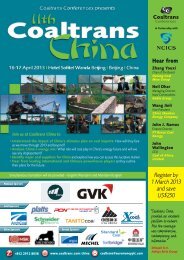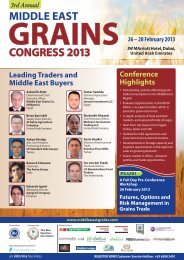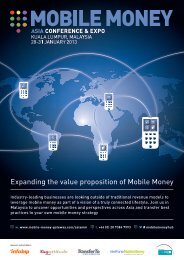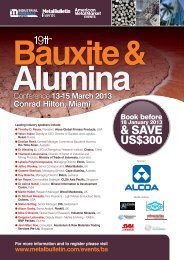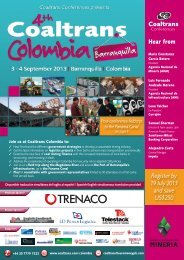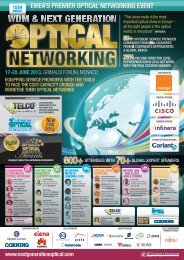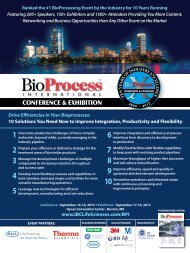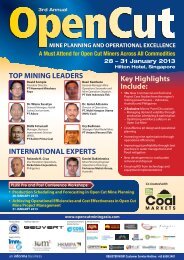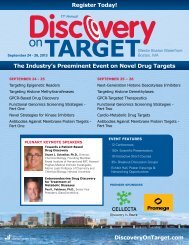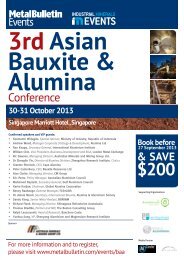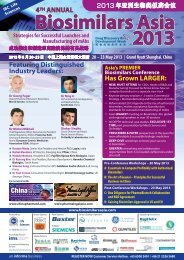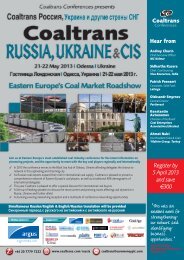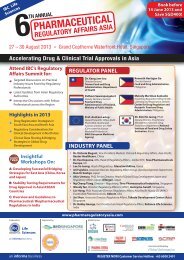Cell Line Development & Engineering
Cell Line Development & Engineering
Cell Line Development & Engineering
You also want an ePaper? Increase the reach of your titles
YUMPU automatically turns print PDFs into web optimized ePapers that Google loves.
12:55 Chairman’s Remarks<br />
Lisa J. Graham, Ph.D., P.E., Senior Vice President, Bend Research Inc.<br />
Developing <strong>Cell</strong> <strong>Line</strong>s for Biosimilars<br />
1:00 Glycoexpress: A Toolbox of Human <strong>Cell</strong> <strong>Line</strong>s for the<br />
Production of Glycooptimized Biotherapeutics<br />
Glycosylation is the major post-translational modification of biotherapeutics<br />
that depends on the cell line used for production. By establishment of the<br />
GlycoExpress toolbox we have generated a set of glycoengineered human cell<br />
lines for the high yield production of fully human glycoproteins. Currently, five<br />
different cell lines are established which allow the production of glycoproteins<br />
with different glycosylation features.<br />
Steffen Goletz, Ph.D., Chief Executive Officer, Chief Scientific Officer,<br />
Glycotope GmbH, Germany<br />
1:30 UNPUBLISHED DATA Challenges in <strong>Cell</strong> <strong>Line</strong> and Process<br />
<strong>Development</strong> for NBEs and Biosimilars<br />
In developing NBEs and biobetters, speed, titer and an excellent product<br />
quality are all key elements, while for biosimilars, matching the originator<br />
product quality is the essential target. Here, we show how the use of our<br />
integrated BI-HEX platform which is based on well characterized cell lines<br />
and thorough understanding of USP and DSP processes is used to achieve<br />
fast and reliable development of high-titer cell lines and manufacturing<br />
processes, and how understanding of the process can be used to influence<br />
product quality attributes to successfully meet the target.<br />
Till Wenger, Ph.D., Associate Director, <strong>Cell</strong> Biology, <strong>Cell</strong> Culture II, Process<br />
Science, Boehringer Ingelheim, Germany<br />
2:00 2nd Generation Sequencing for <strong>Cell</strong> <strong>Line</strong> Characterization<br />
during Biosimilar <strong>Development</strong><br />
Biosimilar cell line development is a multi-step process, based on quality by<br />
design principles to generate a cell line producing a recombinant protein<br />
as similar to the originator’s protein as possible. Essential part of cell line<br />
development is genetic characterization. In addition to standard techniques,<br />
2nd generation sequencing technologies enable deeper look into the parts of<br />
genome and transcriptome interesting for cell line developers.<br />
Dominik Gaser, Ph.D., Senior Scientist, <strong>Cell</strong> & Molecular Biology,<br />
Sandoz Biopharmaceuticals, Slovenia<br />
2:30 Networking Refreshment Break<br />
Implementation of Analytical Tools and Strategies to<br />
Help Improve Clone Selection, Process Monitoring,<br />
Understanding and <strong>Development</strong><br />
3:00 UNPUBLISHED DATA High Throughput Imaging During <strong>Cell</strong> <strong>Line</strong><br />
<strong>Development</strong> to Increase the Assurance of Clonality<br />
We are developing a fluorescent high throughput automated imaging protocol that<br />
can provide direct evidence on whether the cell line originated from one cell during<br />
the cloning step. To accommodate the throughput of the cell line development<br />
workflow at Genentech, fluorescent cell staining and automated fluorescent cell<br />
counting are used to reduce the need to manually inspect brightfield images. Since<br />
image data is acquired to track clone growth for all clones during the single-cell<br />
cloning process, confluence data or other electronic data can be used to drive<br />
automated hit-picking from the 384-well plates thus increasing efficiency and<br />
reducing ergonomic stress. We discuss the challenges and solutions implemented<br />
during the development of this protocol.<br />
David Shaw, Ph.D., Scientist, Early Stage <strong>Cell</strong> Culture, Genentech, Inc.<br />
3:30 CASE STUDY • UNPUBLISHED DATA Data Integration Methodology<br />
that Leverages Coupled Bioreactor Analytics, Automated<br />
Sampling, and Applied Mathematics to Redefine Bioreactor<br />
Operation; Case Study Example Illustrating Impact on <strong>Cell</strong><br />
Culture Productivity<br />
Process analytics can provide key links between process operation and product<br />
quality by enabling better data to strategically meet dynamic nutrient requirements<br />
of cell cultures. Individual analytics tools can also be coupled using the right data<br />
integration and applied mathematics techniques to provide “real time” guidance<br />
for process design and operation. Examples are shown, including a case study<br />
linking dielectric spectroscopy frequency spectra with the onset of apoptosis,<br />
which can then be linked to changes in cell performance and productivity.<br />
Lisa J. Graham, Ph.D., P.E., Senior Vice President, Bend Research Inc.<br />
Wednesday, May 22, 2013 (continued)<br />
4:00 CASE STUDY • UNPUBLISHED DATA LC-MS/MS and Data Searching<br />
Strategies for Sequence Variance Detection<br />
Mass spectrometry provides a powerful tool for detecting low-abundance<br />
sequence variants within monoclonal antibodies. However, it is challenging<br />
to perform data analysis in a highly efficient and error-free manor. The use of<br />
currently available LC-MS instruments with high levels of sensitivity, precision<br />
and accuracy in combination with proteomic and statistical software allow<br />
for semi automation of data analysis for sequence variant analysis.<br />
Hangtian Song, Ph.D., Research Investigator I, Global Manufacturing and<br />
Supply, Bristol-Myers Squibb Co.<br />
4:30 Scale-Down Automated Purification and Protein Analytics<br />
to Facilitate <strong>Cell</strong> <strong>Line</strong> Screening/PQ Analysis<br />
Abstract not available at time of print. Please visit<br />
www.IBCLifeSciences.com/<strong>Cell</strong><strong>Line</strong> for updates.<br />
Ling Santora, Ph.D., Senior Scientist III, AbbVie<br />
5:00 Close of Conference<br />
3EASY WAYS<br />
TO REGISTER:<br />
Industry Fees By March 1, 2013<br />
By March 29,<br />
2013 By April 26, 2013<br />
Standard Rate<br />
After April 26, 2013<br />
Main Conference Plus<br />
Dinner Symposium (Tues PM)<br />
$2299 $2399 $2499 $2699<br />
Main Conference Only $1899 $1999 $2099 $2299<br />
Academic/Govt. Fees* By March 1, 2013<br />
By March 29,<br />
Standard Rate<br />
2013 By April 26, 2013 After April 26, 2013<br />
Main Conference Plus<br />
Dinner Symposium (Tues PM)<br />
$1599 $1699 $1799 $1999<br />
Main Conference Only $1199 $1299 $1399 $1599<br />
Present a Poster to Enhance Your Conference Experience<br />
All poster presenters must be registered conference attendees. The fee to present a poster in addition<br />
to your conference registration is:<br />
Vendors/Supplier*: $300 Pharma/Biotech: $100 Academic/Government: FREE<br />
* Vendor rate is for exhibiting/sponsoring companies and/or posters that upon review are of<br />
commercial/product focus<br />
Venue and Accommodations<br />
Hyatt Regency La Jolla<br />
3777 La Jolla Village Drive, San Diego, CA<br />
Priority Code: B13189PDFWDL<br />
CALL<br />
800.390.4078 or EMAIL<br />
+1.941.554.3500 @ reg@ibcusa.com<br />
WEB<br />
www.IBCLifeSciences.com/<strong>Cell</strong><strong>Line</strong><br />
Special Conference Rate<br />
$229 Per Night Plus Tax<br />
Tel: 858-552-1234 • Central Reservations: 402-592-6464 or 1-888-421-1442<br />
www.lajolla.hyatt.com<br />
Please call the hotel directly at the numbers above before April 19, 2013 to be included in IBC’s dedicated<br />
room block for this conference. Please identify yourself as a participant in IBC’s <strong>Cell</strong> <strong>Line</strong> <strong>Development</strong> and<br />
<strong>Engineering</strong> conference to receive the reduced room rate. Be sure to make you reservations as soon as possible<br />
as rooms tend to fill up very quickly and all reservations are subject to availability.<br />
Additional Registration Information<br />
For onsite registrations, please add $100.<br />
Program content and speakers subject to change. Conference badges are non-transferable and lost badges will<br />
not be replaced without payment of the full conference registration fee.<br />
Please note that payment is required in advance of the conference. Please make check(s) (in U.S. funds drawn<br />
on a U.S. bank) payable to IBC Life Sciences and attach to the registration form. Confirmation of your booking<br />
will be sent. Should you elect to pay by MasterCard, Visa or American Express, please send your credit card<br />
number, expiration date, name as it appears on card and signature along with the registration form.<br />
Registration Substitutions/Cancellations: If you need to make any changes or have any questions, please feel free to<br />
contact IBC’s customer service team via email at reg@ibcusa.com. Cancellations must be in writing and must be received<br />
by IBC prior to 10 business days before the start of the event. Upon receipt of a timely cancellation notice, IBC will issue<br />
a credit voucher for the full amount of your payment, which may be applied towards registration fees at any future IBC<br />
event held within 6 months after issuance (the “Expiration Date”). All credit vouchers shall automatically expire on the<br />
Expiration Date and shall thereupon become void. In lieu of issuance of a credit voucher, at your request, IBC will issue a<br />
refund less a $595 processing fee per registration. Registrants are advised that no credit vouchers or refunds will be issued<br />
for cancellations received 10 business days or less prior to start of the event, including cancellations due to weather or<br />
other causes beyond the Registrant’s control. IBC therefore recommends that registrants allow for unexpected delays in<br />
making travel plans. Substitutions are welcome at any time. If for any reason IBC decides to cancel this conference, IBC<br />
accepts no responsibility for covering airfare, hotel or other costs incurred by registrants, including attendees, sponsors,<br />
speakers and guests.<br />
SPECIAL NEEDS: If you have a disability or special dietary needs, please let us know in order that<br />
we may address your special needs for your attendance at this show. Please send your special<br />
needs via email to custserv@ibcusa.com. <br />
For up-to-date program information and new abstracts, visit: www.IBCLifeSciences.com/<strong>Cell</strong><strong>Line</strong> 7



